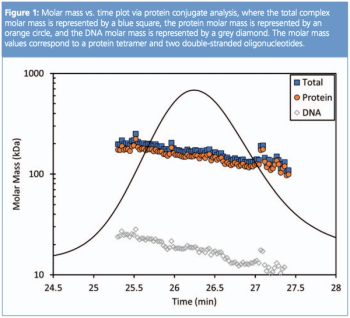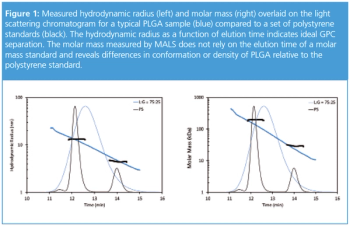
Sophia Kenrick
Sophia Kenrick, PhD,* is an application scientist at Wyatt Technology Corporation, 6300 Hollister Ave, Santa Barbara, CA 93117-3253.
Articles by Sophia Kenrick


This article presents two case studies regarding the characterization of protein-DNA complexes using two complementary multi-angle light scattering (MALS) techniques, namely size-exclusion chromatography (SEC–MALS) to determine absolute molar mass of each component, and composition-gradient MALS (CG–MALS) to quantify stoichiometry and affinity at binding sites in solution.

The functional properties of polymers, such as poly(lactic-co-glycolic acid) (PLGA), relevant to drug delivery and biomedical devices, are governed by the molecular properties of molar mass, composition, conformation, and branching. This article demonstrates how such polymers are fully characterized, quickly and absolutely, using gel permeation chromatography (GPC) with multi-angle light scattering (MALS) and online viscometry.

The degree and strength of self-association are critical quality attributes for insulin and its analogues. In this article we present the label-free determination of these quantities using composition-gradient multi-angle light scattering (CG-MALS), enabling the formulation of engineered insulin optimized for stability and efficacy.

Ultra-high performance liquid chromatography (UHPLC) enables fast, efficient separation of biomolec-ular samples. Compared to standard SEC, UHP-SEC provides improved resolution, higher throughput, less solvent and smaller sample consumption for analysis of precious biological samples.

The affinity and absolute stoichiometry of interactions between a DNA aptamer and a tetrameric target is quantified using CG-MALS is discussed.
Latest Updated Articles
 Quantifying AAV Quality Attributes Using SEC–MALS
Quantifying AAV Quality Attributes Using SEC–MALSPublished: April 6th 2021 | Updated:
 Binding Affinity and Stoichiometry of a Multivalent Protein-Aptamer Association
Binding Affinity and Stoichiometry of a Multivalent Protein-Aptamer AssociationPublished: June 3rd 2013 | Updated:
 Absolute Molar Mass in UHPLC via the µDAWN and UT-rEX
Absolute Molar Mass in UHPLC via the µDAWN and UT-rEXPublished: February 18th 2015 | Updated:
 Label-Free Characterization of the Reversible Self‑Association of Insulin
Label-Free Characterization of the Reversible Self‑Association of InsulinPublished: December 1st 2016 | Updated:
 Enhancing PLGA Characterization with Multi-Angle Light Scattering and Differential Viscometry
Enhancing PLGA Characterization with Multi-Angle Light Scattering and Differential ViscometryPublished: September 21st 2018 | Updated:
 Characterizing Protein-Nucleic Acid Conjugates with Light Scattering
Characterizing Protein-Nucleic Acid Conjugates with Light ScatteringPublished: November 12th 2018 | Updated: